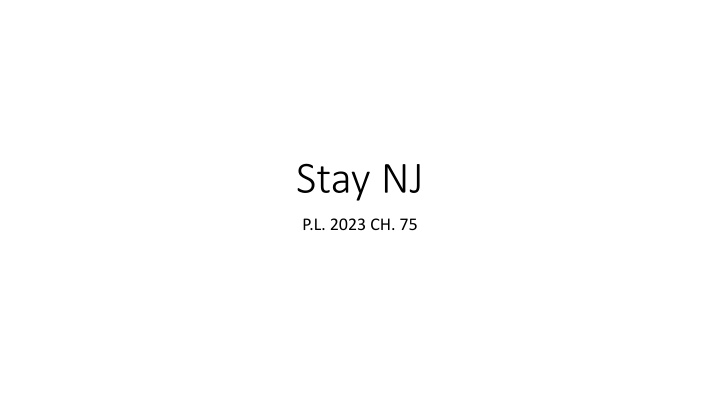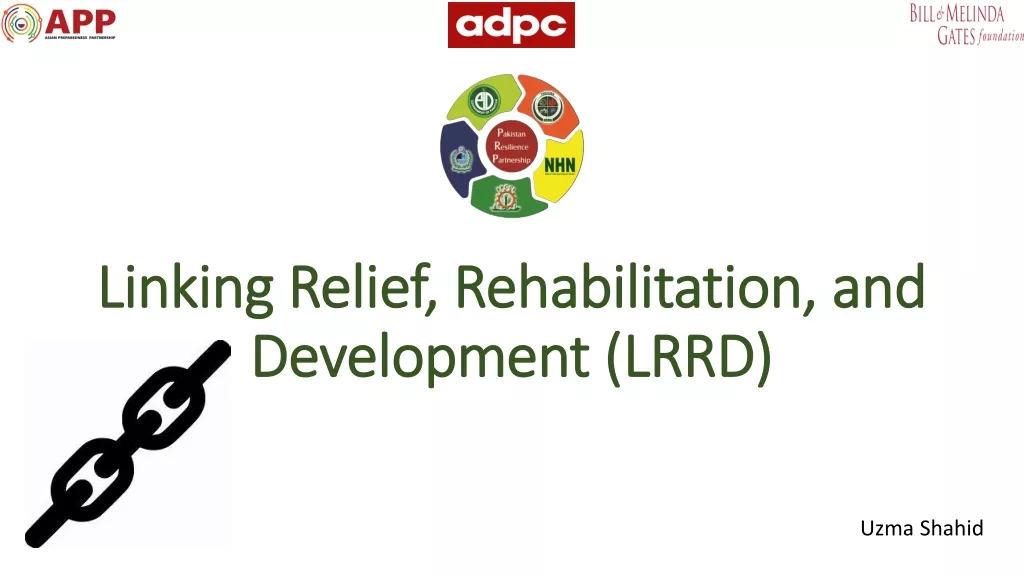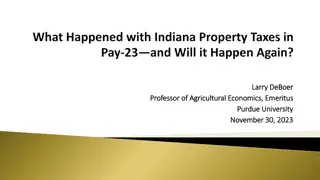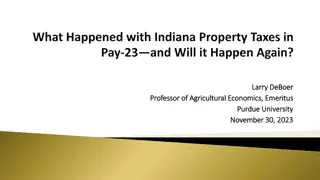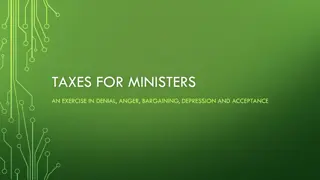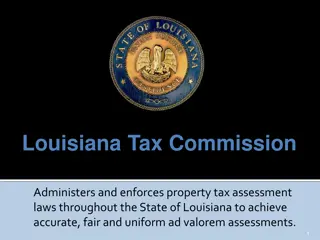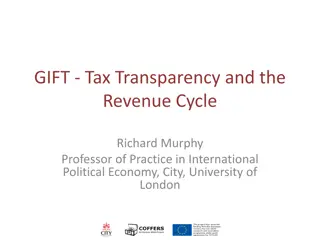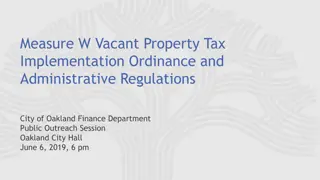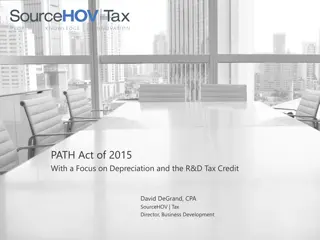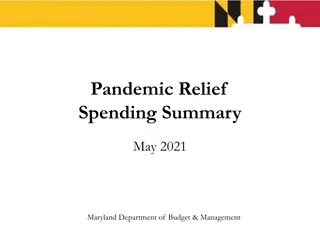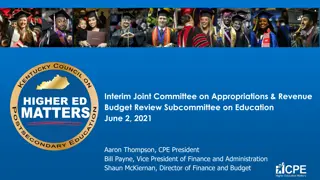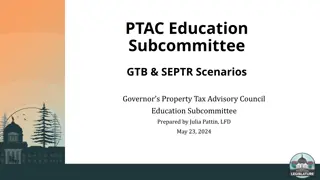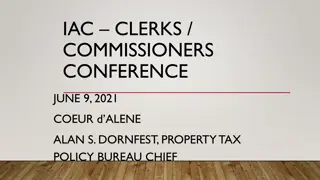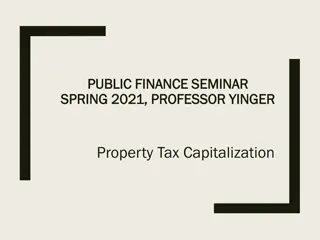Property Tax Relief Programs in New Jersey
New Jersey offers several property tax relief programs including Legacy Program - ANCHOR, Senior Freeze PTR, and the new program Stay NJ (P.L. 2023, CH. 75). These programs provide benefits to qualified taxpayers, seniors, and homeowners based on income thresholds and residency requirements. Stay NJ offers a maximum benefit of 50% of property taxes or $6500 for seniors with earned NJ income of less than $500,000. The programs have specific application processes and payment schedules to help alleviate the burden of property taxes for eligible individuals.
Download Presentation

Please find below an Image/Link to download the presentation.
The content on the website is provided AS IS for your information and personal use only. It may not be sold, licensed, or shared on other websites without obtaining consent from the author.If you encounter any issues during the download, it is possible that the publisher has removed the file from their server.
You are allowed to download the files provided on this website for personal or commercial use, subject to the condition that they are used lawfully. All files are the property of their respective owners.
The content on the website is provided AS IS for your information and personal use only. It may not be sold, licensed, or shared on other websites without obtaining consent from the author.
E N D
Presentation Transcript
Stay NJ P.L. 2023 CH. 75
Legacy Program - ANCHOR Any qualified taxpayer, senior or otherwise Rent or own Based on tax year, two prior example for CY 2023/TY 2022, ANCHOR benefit was based on 2020 TY Income limit not more than $250,000 (renters $150,000) and based on NJ income Paid by check or direct deposit Requires a new application each year with a PIN and ID for homeowners. If taxpayer has no changes to previously filed application, Taxation may apply for them. Benefit currently paid in last quarter of CY up to $1750 for homeowners and $700 for renters depending on income and age
Legacy Program Senior Freeze PTR Senior homeowners only Qualified seniors are able to freeze property taxes when they first qualify. This is referred to as a base year First time applicants must qualify for two consecutive years 2024 benefit will be based on 2022 and 2023 tax years Income threshold now $150,000 + owned and resided in the homestead for three years Income threshold indexes annually Requires an annual, mostly paper application that includes verification of income and proof of payment of property taxes Income requirement is tied to the PAAD program and generally includes income from all sources Application period starts in February of each year and benefits begin to get paid out by check during July of each year. Taxpayer pays their higher property taxes and the State reimburses them for the difference between the current payment and the frozen amount from the base year. N.J.S.A. 54:4-8.71 requires the Director to mail payments to eligible claimants.
New program Stay NJ (P.L. 2023, CH.75) Creates a new property tax relief program called Stay NJ Maximum benefit - credit equal to up to 50% of property taxes or $6500 Seniors only (65 years of age as of 7/1/2024) Earned NJ income of less than $500,000 Owned a NJ home as a principal residence as of 7/1/2024 Benefit is applied as a quarterly credit to municipal property taxes effective 1/1/2026 tax year Law does not eliminate the two existing property tax relief programs Senior Freeze and ANCHOR Law requires a comparison of benefits under the two legacy programs compared to Stay NJ. The higher calculated benefit is approved.
New program Stay NJ (P.L. 2023, CH.75) Effective 1/1/2026 - funding would be included in the FY2026 (7/1/25) state budget (six month impact). Additionally, the enabling legislation requires annual appropriations for FY2024 and FY2025 held in escrow Stay NJ pre-requisites for funding in any given year Full funding of K-12 education Full funding of $250 property tax deduction for veterans and $250 property tax deduction for senior citizens and disabled persons Full funding of the contributions to the retirement systems Budget surplus of 12% If the above are not met, Stay NJ is not funded. This requirement would prohibit Stay NJ from being operationalized in a given year but the two legacy programs would remain (subject to appropriation)
Stay NJ Administrative Requirements Creation of a task force Appointment of an executive director to the task force Development of a combined single application to meet the requirements of the three property tax relief programs Quarterly activity reports and final report with recommendations by May 30, 2024
Role of task force - P.L. 2023, CH 75; 18.a. Develop recommendations for establishing and funding uniform property tax relief. Present to the Governor and the Legislature, no later than May 30, 2024, a report containing recommendations about how to restructure, and consolidate, the various property tax relief programs into one, streamlined, property tax relief program. The report shall include recommendations concerning system improvements that both the State and local government units would need to implement the Stay NJ property tax credit program and the funding required to establish and maintain such system improvements. The task force shall provide recommendations that have a target implementation date of January 1, 2026.
Final Report May 30, 2024 report to the Governor and the Legislature detailing the task force s recommendations, including any recommendations for legislative or regulatory action that are necessary to effectuate the recommendations. Legislature and Executive shall consider the task force s recommendations and have until 90 days prior to July 1, 2025 to enact any required legislation. If the deadline is not met, Stay NJ and the combined single application is delayed. Deferral/Delay of Stay NJ may occur if Funding pre-requisites are not met. Stay NJ cannot obstruct full funding of the pre-requisites. Necessary legislation to effectively implement the program is not enacted.
Challenges Areas to focus on Payment method (Stay NJ v. ANCHOR and Senior Freeze) Program year (ANCHOR v. Stay NJ and Senior Freeze) Definition of income (Senior Freeze v. ANCHOR and Stay NJ) Alignment with Senior Freeze in year one Expected local government issues
Program Differences Stay NJ Payment method property tax credit (quarterly) Program year most recent tax year Definition of income NJ income ANCHOR Payment method check or direct deposit (Director has flexibility) Program year two years prior (2023 benefit based on 2020TY) Definition of income NJ income Freeze Payment method reimbursement paid by check Program year most recent two years (2023 benefit based on 2022TY and 2021TY) Definition of income PAAD definition income from all sources
Stay NJ Payment Requirements The director shall determine which property tax benefit program or programs provide the greatest benefit for the applicant. An applicant shall only be entitled to the greater of: the amount of the Stay NJ property tax credit; or the combined amount of the ANCHOR property tax rebate and the Senior Freeze (homestead property tax reimbursement). N.J. Stat. 54:4-8.75d
Stay NJ Implementation and Alignment with Senior Freeze Senior Freeze applications are released to seniors in February each year and benefits begin to be paid by July 15th. The application and payment process continues to the end of October. Freeze application is expected by seniors in February 2025, Stay NJ legislation due April 2025, Funding decision around July 1, 2025. The consolidated application is due July 1, 2025 and the benefits applied as quarterly credits starting in 2026 (Feb 2026 property tax bill)
Stay NJ Implementation Timeline Year One CY 2025 FY 2025 FY 2026 March 2025 May 2025 June 2025 Sept 2025 Oct 2025 Jan 2025 Feb 2025 April 2025 July 2025 Aug 2025 Nov 2025 Dec 2025 Jan 2026 Red = Senior Freeze Green = Stay NJ Blue = ANCHOR Based on 2023 program 2024 TY Stay NJ benefit Legislation deadline 2024 TY Stay NJ credit applied Q1 of 2026 property taxes (Feb 2026 tax bill) 2024 TY Stay NJ funding determination and Consolidated Application due 2023 TY/2024 TY Freeze benefit application process begins 2022 TY ANCHOR benefit application process begins 2022 TY ANCHOR benefit payments begin 2023 TY/2024 TY Freeze benefit payments begin
Expected Local Government Issues (related to credits) Timing of Stay NJ may conflict with tax bill Property tax bills are statutorily mandated to be printed in July for quarters 3 and 4 of the current year and quarters 1 and 2 of the following year. Stay NJ application process will occur when tax bills are printed. Final benefit amounts may result in re-printing of tax bills. Technology issues for many municipalities may require investment to upgrade IT infrastructure. Training will be required for both state and local personnel in order to administer the program. This will be difficult under the current timeframe.
